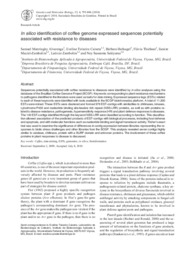In silico identification of coffee genome expressed sequences potentially associated with resistance to diseases.
In silico identification of coffee genome expressed sequences potentially associated with resistance to diseases.
Autoria: ALVARENGA, S. M.; CAIXETA, E. T.; HUFNAGEL, B.; THIEBAUT, F.; ZAMBOLIM, E. M.; ZAMBOLIM, L.; SAKIYAMA, N. S.
Resumo: Sequences potentially associated with coffee resistance to diseases were identified by in silico analyses using the database of the Brazilian Coffee Genome Project (BCGP). Keywords corresponding to plant resistance mechanisms to pathogens identified in the literature were used as baits for data mining. Expressed sequence tags (ESTs) related to each of these keywords were identified with tools available in the BCGP bioinformatics platform. A total of 11,300 ESTs were mined. These ESTs were clustered and formed 979 EST-contigs with similarities to chitinases, kinases, cytochrome P450 and nucleotide binding site-leucine rich repeat (NBS-LRR) proteins, as well as with proteins related to disease resistance, pathogenesis, hypersensitivity response (HR) and plant defense responses to diseases. The 140 EST-contigs identified through the keyword NBS-LRR were classified according to function. This classification allowed association of the predicted products of EST-contigs with biological processes, including host defense and apoptosis, and with molecular functions such as nucleotide binding and signal transducer activity. Fisher?s exact test was used to examine the significance of differences in contig expression between libraries representing the responses to biotic stress challenges and other libraries from the BCGP. This analysis revealed seven contigs highly similar to catalase, chitinase, protein with a BURP domain and unknown proteins. The involvement of these coffee proteins in plant responses to disease is discussed. K
Ano de publicação: 2010
Tipo de publicação: Artigo de periódico
Unidade: Embrapa Café
Palavras-chave: Data mining, ESTs
Observações
1 - Por padrão são exibidas publicações dos últimos 20 anos. Para encontrar publicações mais antigas, configure o filtro ano de publicação, colocando o ano a partir do qual você deseja encontrar publicações. O filtro está na coluna da esquerda na busca acima.
2 - Para ler algumas publicações da Embrapa (apenas as que estão em formato ePub), é necessário ter, no celular ou computador, um desses softwares gratuitos. Sistemas Android: Google Play Livros; IOS: iBooks; Windows e Linux: software Calibre.
Acesse outras publicações
Acesse a Base de Dados da Pesquisa Agropecuária (BDPA) para consultar o acervo completo das bibliotecas da Embrapa.

